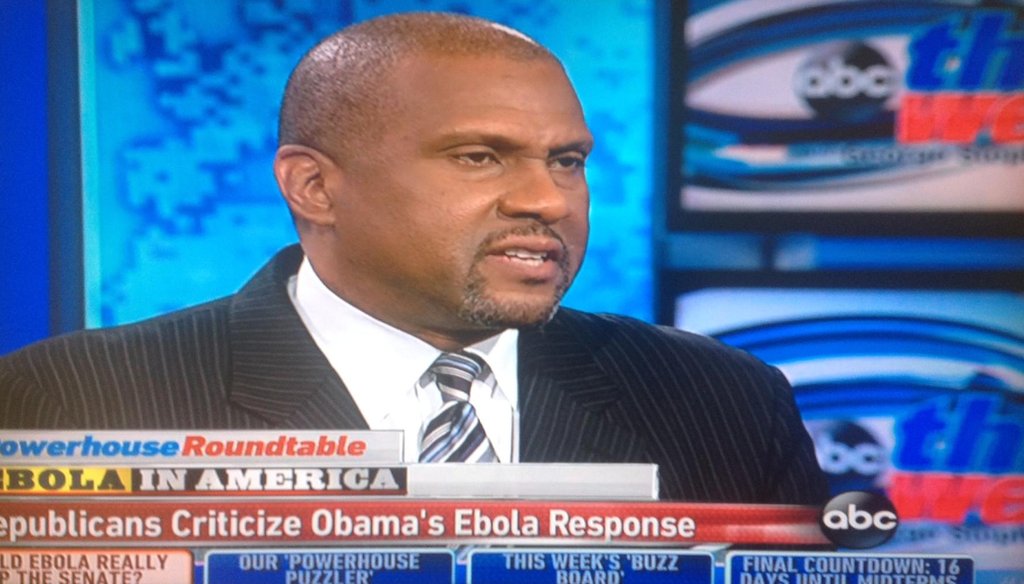



Tavis Smiley on ABC's "This Week" on Oct. 19, 2014.
In an attempt to tamp down panic, some have compared the current Ebola outbreak to past epidemics -- particularly the SARS outbreak of 2003.
On ABC’s This Week Oct. 19, talk show host Tavis Smiley said that those who think President Barack Obama’s response to Ebola is too soft are blowing the situation out of proportion. For context, they should remember the outbreak of SARS -- sudden acute respiratory syndrome -- 10 years ago.
Talking to Republican strategist Mary Matalin, Smiley said, "This is not as bad as SARS was in 2003, and everybody wants to pile on, Mary, like you did on all the things Obama has done wrong. I've been a critic on certain issues, but this is not the president's fault."
Is Smiley right that SARS in 2003 was worse than today’s Ebola crisis?
Well, it depends on the context. We talked to experts and found that looking at the Ebola and SARS outbreaks in their points of origin -- West Africa and Hong Kong, respectively -- Ebola has been more destructive. SARS, on the other hand, had a wider global reach than Ebola.
"It depends on what’s your gauge for ‘worse,’ " said Laurie Garrett, a senior fellow for global health at the Council on Foreign Relations.
Several experts told us that the potential for the Ebola outbreak to grow -- and the humanitarian toll on West Africa -- makes it more worrisome.
A note: Either way, Ebola does not pose a significant threat to the United States, though it may be damaging to other countries.
The effects
To start off, here’s some World Health Organization data comparing the SARS outbreak in 2003 and the current Ebola outbreak as of Oct. 17.
SARS -- 2003
Ebola -- 2014
Number of countries affected
25+
7
Number of cases (global)
8,096
9,216
Health worker cases (global)
1,706
423
Number of deaths (global)
774
4,555
Mortality rate
9.6 percent
50 percent
Number of cases (U.S.)
27
3
Cases contracted in U.S.
0
2
Number of deaths (U.S.)
0
1
Proven treatments
None
None
So by the numbers, Ebola is significantly more deadly. Also, there already are more cases worldwide.
That said, SARS is much more communicable than Ebola, meaning it is easier to catch. It can spread through a sneeze, cough, sharing a beverage or speaking up close with someone who has the disease. It is also possible that SARS travels through the air.
Ebola, on the other hand, is not airborne. Experts say it only possible to get Ebola by coming into direct contact with the body fluids of someone who is sick.
In sum, SARS spread to many more countries than Ebola has so far. However, there have been more cases of Ebola, and the death toll is much higher. The Centers for Disease Control and Prevention anticipates that the number of cases in West Africa could reach the hundreds of thousands by January.
"Both are substantial public health outbreaks" said Dr. David Weber, an expert in epidemiology at the University of North Carolina School of Medicine. "(It’s) not really useful to try to determine which is worse."
From the perspective of a United States citizen considering the two diseases’ impact here, Smiley’s statement might have more weight, said Dr. William Schaffner, an infectious disease specialist at Vanderbilt University. Many more cases of SARS made it to the United States than Ebola cases so far. (though there were no SARS deaths).
It’s also important to remember that the largest focal point of the SARS outbreak (other than Hong Kong) was Toronto -- which brought the disease a little more close to home, Schaffner said. There were 251 SARS cases and 43 deaths in Canada.
Even if the number of Ebola cases in the United States is low -- and lower than the number of SARS cases -- Smiley is incorrect because of the overall humanitarian impact of Ebola when compared to that of SARS, said Dr. Howard Markel, director of the Center for the History of Medicine at the University of Michigan.
"In terms of U.S. (Ebola) cases, it is still minimal," Markel said. "If you're in West Africa, it's a nightmare and very serious, and far more deadly already than SARS was."
Our ruling
Smiley said Ebola "is not as bad as SARS was in 2003."
Both diseases are serious and have harmed communities. SARS spread to more countries and is easier to transmit than Ebola. But Ebola has had more cases and higher death toll, and those numbers continue to rise. SARS may have had more of a presence in the United States, but Ebola is poised to be a larger humanitarian crisis globally.
We rate Smiley’s claim Mostly False.
ABC News, This Week transcript, Oct. 19, 2014
WHO, Ebola update, Oct. 17, 2014
WHO, SARS update, Dec. 31, 2003
CDC, Frequently Asked Questions About SARS, July 2, 2012
CDC, Questions and Answers on Ebola, Oct. 15, 2014
New York Times, "Ebola Facts: When Did Ebola Arrive and Spread at a Dallas Hospital?" Oct. 16, 2014
Los Angeles Times, "More than a decade later, SARS offers lessons on Ebola," Oct. 19, 2014
Washington Post, "Five Myths about Ebola," Oct. 10, 2014
Interview, Laurie Garrett, a senior fellow for global health at the Council on Foreign Relations, Oct. 19, 2014
Interview, Dr. William Schaffner, an infectious disease specialist at Vanderbilt University, Oct. 19, 2014
Email interview, Dr. Howard Markel, director of the Center for the History of Medicine at the University of Michigan, Oct. 19, 2014
Email interview, Dr. David Weber, an expert in epidemiology at the University of North Carolina School of Medicine, Oct. 19, 2014
Email interview, Lawrence Ostin, global health law expert at Georgetown University, Oct. 19, 2014
In a world of wild talk and fake news, help us stand up for the facts.
